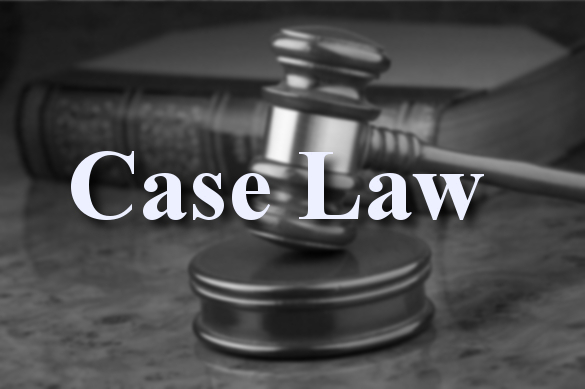Case Laws for Police Officers and Legal Precedents
Case laws play a vital role in shaping the conduct and responsibilities of police officers. They serve as guidelines that influence how law enforcement operates in various situations. By understanding these legal precedents, officers can make informed decisions that align with the law and protect citizens’ rights.
Importance of Legal Precedents in Policing

Legal precedents are essential in policing because they provide a framework for how officers should act in specific scenarios. Here are some key reasons why they are important:
- Guidance: Precedents offer guidance on legal standards and expectations for police conduct.
- Accountability: They hold officers accountable for their actions, ensuring they adhere to the law.
- Consistency: Legal precedents promote consistency in law enforcement practices across different jurisdictions.
- Public Trust: By following established precedents, police can build trust with the communities they serve.
Understanding and applying these precedents is crucial for police officers as they navigate the complexities of their duties. This knowledge can also help prevent legal challenges and improve community relations.
Key Case Laws Affecting Police Conduct

Several key case laws have significantly influenced police conduct. Understanding these cases helps officers recognize their legal boundaries. Here are some notable examples:
| Case Name | Year | Summary |
|---|---|---|
| Terry v. Ohio | 1968 | This case established the “stop and frisk” rule, allowing officers to pat down a suspect if they have reasonable suspicion of criminal activity. |
| Miranda v. Arizona | 1966 | Miranda rights must be read to suspects during interrogations to ensure they understand their rights. |
| Graham v. Connor | 1989 | This case set the standard for evaluating excessive force claims, emphasizing the “objective reasonableness” of an officer’s actions. |
| Whren v. United States | 1996 | Officers can stop a vehicle for any traffic violation, even if they suspect other criminal activity. |
These cases highlight the evolving nature of police conduct and underscore the importance of legal knowledge for officers. Keeping abreast of these laws can help ensure that officers perform their duties within legal boundaries.
Legal Rights of Citizens in Police Encounters

When citizens encounter police officers, they have certain legal rights designed to protect them. Understanding these rights is crucial for ensuring fair treatment and maintaining a balanced relationship between law enforcement and the community. Here are some key rights that every citizen should be aware of:
- Right to Remain Silent: Citizens can refuse to answer questions that may incriminate them.
- Right to Legal Counsel: Individuals have the right to an attorney during police questioning.
- Right Against Unreasonable Searches: Police generally need a warrant or probable cause to search a person or their property.
- Right to Know the Reason for Detention: Citizens can ask why they are being detained or stopped by the police.
- Right to Record Encounters: Individuals can record police interactions as long as they do not interfere with the officers’ duties.
Being aware of these rights can empower citizens during police encounters and help them navigate the situation more effectively. It is essential for both officers and citizens to respect these rights to foster trust and cooperation in the community.
Impact of Supreme Court Rulings on Law Enforcement
The Supreme Court plays a pivotal role in shaping law enforcement policies through its rulings. These decisions establish precedents that law enforcement agencies must follow. Here are some significant impacts of Supreme Court rulings:
- Establishment of Legal Standards: Supreme Court decisions set binding legal standards that officers must adhere to when conducting their duties.
- Influence on Training Programs: Law enforcement training programs often incorporate Supreme Court rulings to ensure officers are educated about legal boundaries.
- Accountability Measures: Rulings promote accountability by outlining consequences for unlawful actions taken by officers.
- Impact on Community Relations: Decisions can affect public perception of law enforcement and impact community trust.
In summary, Supreme Court rulings shape the legal landscape of policing, guiding officers in their daily interactions with citizens and ensuring that justice is served while upholding constitutional rights.
Challenges Faced by Police in Following Legal Precedents
While legal precedents are crucial for guiding police conduct, officers often face challenges in applying these laws in real-life situations. Here are some common challenges:
- Complexity of Laws: Legal precedents can be complex and difficult to interpret, especially in high-pressure situations.
- Changing Legal Landscape: Laws and precedents can change, requiring ongoing training and adaptation from officers.
- Public Expectations: Officers may struggle to balance the need to enforce the law with public expectations and perceptions.
- Resource Constraints: Limited resources can hinder training and the ability to stay updated on legal changes.
- Emotional Stress: The stress of policing can affect decision-making, leading to challenges in adhering to legal standards.
Addressing these challenges requires ongoing training, support from legal experts, and a commitment to upholding the law while serving the community. By fostering a culture of legal awareness and ethical conduct, police can navigate these obstacles more effectively.
Case Law Analysis in Training Police Officers
Training police officers on case law analysis is crucial for effective law enforcement. It helps officers understand the legal framework within which they operate. This knowledge is essential for making informed decisions during their daily duties. Here’s how case law analysis can be integrated into police training:
- Workshops and Seminars: Organizing workshops led by legal experts can help officers learn about significant case laws and their implications.
- Scenario-Based Training: Using real-life scenarios that incorporate case laws allows officers to practice applying legal principles in a controlled environment.
- Regular Updates: Keeping training programs updated with the latest case law ensures that officers are aware of recent legal developments.
- Collaboration with Legal Advisors: Having legal advisors work with training officers can provide clarity on complex legal issues and improve understanding.
- Evaluation and Feedback: Regular assessments of officers’ understanding of case law can identify areas needing improvement.
By incorporating case law analysis into training, police departments can enhance the competence and confidence of their officers, leading to better community relations and more effective law enforcement.
Frequently Asked Questions
Understanding the role of case laws in policing raises several common questions. Here are some frequently asked questions and their answers:
- What are case laws? Case laws are legal principles established through court decisions that guide future cases.
- Why are case laws important for police officers? They provide a legal framework that helps officers understand their rights and responsibilities while enforcing the law.
- How do case laws affect police training? Case laws influence the content of police training programs, ensuring officers are equipped to handle various situations legally and ethically.
- What happens if an officer violates case law? Violating case law can lead to disciplinary action, legal liability, and loss of public trust.
- How can citizens benefit from understanding case laws? Citizens can better protect their rights and engage with law enforcement more effectively when they are informed about relevant case laws.
These FAQs help clarify the significance of case laws in law enforcement and promote a better understanding between police officers and the communities they serve.
Conclusion on the Role of Case Laws in Policing
Case laws play a vital role in policing by providing a legal foundation for law enforcement practices. They establish clear guidelines that help officers understand their authority and the rights of citizens. This understanding is crucial for ensuring fair treatment and upholding justice in the community.
By integrating case law analysis into training programs, police departments can equip officers with the knowledge and skills needed to navigate complex situations effectively. Furthermore, fostering an environment where officers are encouraged to seek clarity on legal issues can enhance accountability and trust within the community.
Ultimately, recognizing the importance of case laws not only helps protect the rights of citizens but also supports police officers in carrying out their duties ethically and professionally. As the legal landscape continues to evolve, staying informed about case laws will remain essential for effective law enforcement.


